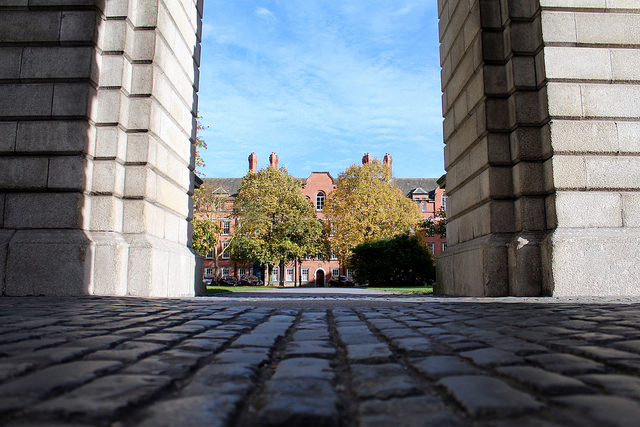Trinity’s ability to directly govern itself without state interference is at unprecedented risk, amid new government proposals for higher education that could radically reduce the size of the College Board and replace current Board members with external appointments, The University Times has learned.
Proposed reforms to the Higher Education Authority Act, published by Minister for Higher Education Mary Mitchell O’Connor over the summer, have been criticised for the changes they seek to make to the way that Irish higher education institutes are run.
For Trinity, the proposals could result in a major recalibration of Board that could see its membership reduced from 27 members to 15 and external members appointed to the Board, according to internal Board documents seen by The University Times as well as conversations with several Board members, some of whom spoke on the condition of anonymity.
The new government legislation will give new regulatory powers to the Higher Education Authority – which will be rebranded the Higher Education Commission – and allow it to carry out reviews into the governance of third-level institutions.
The changes have sparked concerns among College staff about the possibility of heightened government interference in Trinity’s affairs.
And an internal Board memorandum, seen by The University Times, states that the government’s proposals “envisage substantial changes to the governance of the universities in Ireland in respect of issues such as size of governing authorities, separation of the role of the Chair and the role of the Visitor system”.
A verbal report at Board clarified that the size of the Board could be cut from its current membership of 27 to just 15, a number that would include external appointees in place of staff members, four separate Board members confirmed to The University Times.
The proposals could also do away with Trinity’s Visitor system – a two-person panel including the Chancellor of the university and a government appointee that hear appeals against decisions of College bodies, including the College Board – and could strip Provost Patrick Prendergast of his Board chairmanship.
A College Board review working group, set up last year to examine the results of a self-evaluation carried out by the Board, has been tasked with looking into the proposals. Two members of Board dissented from the decision to use the same working group to examine this new issue.
One, Sarah Alyn-Stacey, a Fellow and a member of the College Board, told The University Times: “This is the biggest challenge to the identity of the College since probably the 1967 merger [of Trinity and University College Dublin] proposed by Donagh O’Malley.”
Alyn-Stacey said that “the current composition of the working group, which was set up just to review the self-evaluation documents by Board, is not sufficient for the current challenge presented by these government proposals”.
“We need a far more extensive committee to deal with this, along with some hard hitters and some high-profile people in College.”
Speaking to The University Times, Prof Eunan O’Halpin, the Bank of Ireland Professor of Contemporary Irish History and a member of Board, said the proposed changes are a “cause for great concern”.
“It’s just reducing the involvement of the people who actually work here in the running of the university. And that’s intrinsically wrong”, he said.
O’Halpin said that “it’s very important that there’s sufficient people speaking who come from the College community”, and added that a smaller Board would “completely lose any kind of representative quality”.
Alyn-Stacey said she was worried about the risk to university autonomy: “We’re going to end up with universities that are shaped in terms of the disciplines taught by government agendas.”
College, she said, “has to give a robust response”.
In an email statement to The University Times, Trinity’s Director of Public Affairs and Communications Tom Molloy said that the “size of the Trinity Board and its composition are currently set down in legislation and a change in that legislation by the Oireachtas would be required in order to amend it”.
Molloy wrote that the Board’s “working group is to meet in the coming weeks and will take the time required to conduct a comprehensive review”.
Contained in the government’s proposed legislative reforms is the idea of creating codes of practice for higher education institutes, “which will provide guidelines on the effective governance of the institutions of higher education”.
A Board memorandum seen by The University Times states that the “proposals allow for the appointment of reviewers and observers and include a graduated sanction regime depending on the level of the issue”.
“The proposals”, according to the memorandum, “would legislatively strengthen the HEC’s regulatory remit and would provide a legislative footing for many of the frameworks that have been agreed / imposed upon the sector over a number of years”.
Alyn-Stacey said that “I don’t think it is presented as a proposal – there’s a finality to it”.
O’Halpin said that “the Board’s card has been marked”.
“We’re weak, not strong, in some aspects of oversight”, O’Halpin said of the Board. “But if it were not that there were quite a number of people on Board who basically aren’t scared of the management, we’d know even less about how the university is run, and it would be run worse, not better.”
Board members have spoken out in the past about issues they’ve had with the management of Board, including the “dictatorial” approach of Prendergast and the late circulation of documents.
In 2015, The University Times revealed that many members of Board were unhappy with the way Board was being run. Speaking on the condition of anonymity, one non-student Board member said: “I was treated at that board meeting with disrespect – I in return have no further respect for the way the College is being run.”







